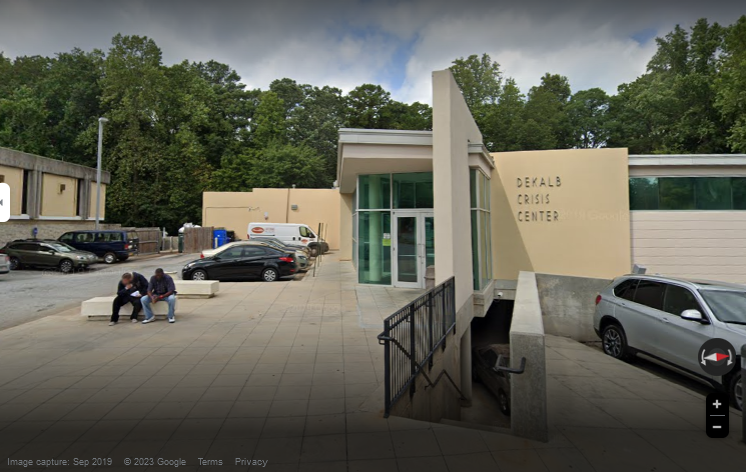
Caption
DeKalb County's regional crisis center opened in 1997, and it’s currently the only designated behavioral health crisis center in Clayton, Cobb, DeKalb, Fulton, Gwinnett and Newton/Rockdale counties.
Credit: Google maps
LISTEN: The DeKalb County Board of Commissioners is asking taxpayers to chip in $15 million dollars for a new mental health crisis facility. GPB’s Ellen Eldridge reports on a proposed new tax.

DeKalb County's regional crisis center opened in 1997, and it’s currently the only designated behavioral health crisis center in Clayton, Cobb, DeKalb, Fulton, Gwinnett and Newton/Rockdale counties.
The DeKalb County Board of Commissioners is asking taxpayers to chip in $15 million dollars for a new mental health crisis facility.
Part of the proposed special purpose local option sales tax — or SPLOST— will help the DeKalb County Regional Crisis Center meet the growing demand for access to mental health crisis intervention and stabilization services, Commissioner Ted Terry said.
The existing regional crisis center opened in 1997, and is currently the only designated behavioral health crisis center in Clayton, Cobb, DeKalb, Fulton, Gwinnett and Newton/Rockdale counties for patients who are mostly uninsured adults.
Terry said taxpayer dollars are best spent investing in community emergency mental health services because the alternative perpetuates a broken cycle.
"The DeKalb County jail is the largest mental health care facility in DeKalb County," Terry said. "And everyone agrees, all the actors agree, that if you're having a mental health issue, being in jail is the last place that we really want to send someone."
But if there is an issue, people in crisis have to be taken somewhere, he said.
The cost to fund the $25 million project is shared among state and local governments, Terry said, and includes construction of a new building to offer emergency evaluation services; temporary observation and crisis stabilization units; a transitional residential program; and a peer support center that would also serve as a meeting area for local Alcoholics Anonymous and other substance use disorder groups.
“It really would be the first of its kind in the state of Georgia, really looking at the whole gamut of crisis intervention and recovery at one location.”
— Ted Terry
Shelby Roche, DeKalb County Regional Crisis Center’s director for crisis services, said the unit currently has 36 beds for people who need a temporary place to stay due to behavioral health illness.
Grady Memorial Hospital in Atlanta is one of the other crisis receiving facilities in the area, but with the closure of Wellstar Atlanta Medical Center and other strains on the mental health care system, resources are stretched thin, she said.
"There is definitely a need (for more beds because) if the individuals don't come to a crisis center for stabilization, they're going to be crowding either our jails or our local hospitals," Roche said. "And our hospitals don't have the capacity to treat individuals."
When complete, another 24 beds in the county's transitional residential program will be available.
This is part of what Terry called a historic investment in improving access to mental health services.
“It really would be the first of its kind in the state of Georgia, really looking at the whole gamut of crisis intervention and recovery at one location,” he said.
This is needed because of the growing demand for help related to social anxiety and depression, which worsened as the COVID-19 pandemic forced people to quarantine and cope with the psychological and economical effects of the pandemic.
More than 36,000 Georgians have died from COVID-19, and more than 3 million cases of the infection have been reported, many of which resulted in long-term physical and mental health symptoms often grouped together as long COVID.
Using public dollars on behavioral health emergency services keeps residents out of the criminal justice system, which saves money and improves lives, Terry said.
"We are spending literally millions of dollars every year on all of these other facilities," Terry said. "By investing in this crisis recovery center, we're not only making an investment in the health and well-being of our neighbors, our residents, and our citizens, (we) also (have) a way to divert individuals away from these more costly care models at the ER as well as at the jail."
Voters in DeKalb County can approve the SPLOST on the Nov. 7 municipal ballot. If approved, construction on the CSU's new building could begin in April 2024.